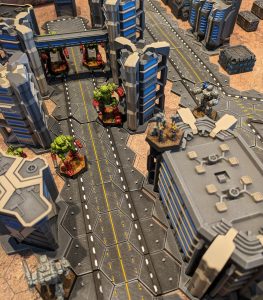Supercharger
Sarna News

- HEXTECH Review - Wave 3 Brings More Urban Options To Your Battlefield
- Your BattleTech News Round-Up For March, 2024
- Crashing 'Mechs With Jennifer Brozek, Author Of The Rogue Academy Trilogy
- Getting The Word Out With Rem Alternis, Catalyst Community & Marketing Director
- Bad 'Mechs - Yeoman
- Read more →
A supercharger is a device which temporarily exceeds the normal safe operating levels of an engine to boost the ground speed of combat vehicles, support vehicles, IndustrialMechs, and BattleMechs. While this compromises safety with an increasing chance of critical engine damage, in any field such as racing or war where there is a need for speed, people are willing to throw safety to the wind for a performance boost.[1] [2]
Description[edit]
Despite the wide differences in underlying technology, both internal combustion engine and fusion engine superchargers produce almost identical results and thus boost ground speed by as much as 125%[1] [2]. In an ICE, a supercharger simply injects oxidizers into the fuel mix to increase power, while fusion engine superchargers temporarily allow the fusion engine to operate beyond its design limits, disabling the limiters that normally keep the engine from damaging its own shielding.
Because BattleMech superchargers use an entirely different method of increasing performance than that used by a MASC system, both devices can be used simultaneously for a cumulative speed boost in exchange for a considerable increase to the odds of a catastrophic failure. [1] [2]
While an unusual if experimental add-on for centuries, the technology achieved a mainstream level of acceptance and refinement during the Word of Blake Jihad, with manufacturers within both the Inner Sphere and the Clan-space regularly producing superchargers from 3078 on. [3]
Rules[edit]
Game Rules[edit]
Operating similarly to MASC, when a player first activates a supercharger, they roll 2D6. On a result of 3+, the supercharger operates normally, allowing the unit to move at twice its Cruising or Walking MP speed (adjusted for modifiers such as damaged leg actuators, etc.) for that turn. On a failed activation roll, unlike MASC the critical hits are applied directly to engine for 'Mechs and to motive systems first and then destroying engine after immobilization. The Supercharger is automatically destroyed upon failure. Each consecutive turn the supercharger is used, the target number increases by 2, each turn the player ceases to use the supercharger the target number is reduced by 1. [1] IndustrialMechs and Support Vehicle apply an additional -1 modifier to the activation roll under TO rules. [2]
The supercharger weighs one-tenth of the unit's engine weight (rounded up to the nearest half-ton) and occupies 1 critical slot on 'Mechs and one item location on vehicles. 'Mech carrying a supercharger must mount the system in a location that contains engine slots, either the center torso on standard engines or additionally the left or right torsos for light and XL engines. [4] Superchargers can be pod-mounted by OmniMechs and OmniVehicles. [1]
'Mechs carrying both a Supercharger and MASC can use both devices within the same round for a cumulative speed boost, making separate activation rolls for each, receiving a Running MP equal to 2.5 its normal Walking MP rounded up. [2] (Previously 3 times its normal Walking MP under MaxTech) [1]
Notes[edit]
- BattleTech internal combustion engine superchargers function in an entirely different way to their real world namesakes, which pressurize the air intake charge by means of compression, which forces more oxygen into the cylinder than a naturally-aspirated engine can normally draw in during the intake cycle. However, its description is consistent with real-world nitrous systems, which inject liquid nitrous oxide (an oxidizer, so chemically it acts just like additional oxygen) into the engine's intake manifold, that then reacts with additional injected fuel to produce more power.
References[edit]
- ↑ 1.0 1.1 1.2 1.3 1.4 1.5 Maximum Tech, p. 92 "Equipment - Supercharger"
- ↑ 2.0 2.1 2.2 2.3 2.4 Tactical Operations, p. 345, "Advanced Weaponry and Equipment - Supercharger"
- ↑ Technical Readout: Prototypes, p. 207 "Jihad Technology Advancement Table - Supercharger"
- ↑ Tactical Operations, p. 344 "Advanced Weaponry and Equipment - Construction Rules - Supercharger"

